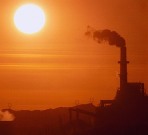 |
|
Utility
Services
Exergetic Systems
has the experience and expertise to make generic evaluations of all power plants
on a utilities' grid. A typical application of this service resulted in
identification of 2% improvement/unit for 5 units, and an average of 6%
improvement/unit for another 4 units. These results were demonstrated in only
two months!
This service performs the following tasks:
▪ Review P&IDs and available acceptance test data.
▪ Visits
are made to key units involving an interview of plant personnel (engineers
and
operators) and pipe walk-downs.
▪ Collection of current plant
data allowing for boiler efficiency computations.
▪ Simulations of all steam generators using the EX-FOSS program. Summary
analysis is made of the 12 page EX-FOSS engineering
report. Such
summaries include the determination of unit "effectiveness" allowing caparisons
between units (unlike the traditional heat rate parameter).
▪ HP and IP turbine efficiencies are complete with judgment made as
to the
turbine seal leakages, etc.
▪ Studies are made of all feedwater heater systems using Second Law analysis of
irreversibilities, relative
irreversibilities, the heater's susceptibility for inducting
the turbine with liquid water, qualifying the
highest maintenance heater in each
unit, and for design errors.
▪ Summaries are made of relevant parameters for all units (e.g., turbine
efficiencies, TTDs, heater problems, etc.).
The principle deliverables
from this work are recommendations to plant performance engineers for long-term
heat rate improvement.
In recommending to performance engineers, we
have found that within many organizations such roles are either greatly diluted
or completely missing. A group of experienced performance engineers have
discussed such situations in a recent ASME paper:
"What's Wrong with Thermal Performance Engineering".
To
summarize our beliefs, the professional life of a performance engineer is not
devoted to the management of energy flows, nor to the conservation of fuel per
se. Our raison d'être is the generation of adequate electricity for society
using minimum fuel. This two-sided livelihood does not result nor imply the
closing of power stations to conserve fuel. Further the concept of unit heat
rate, as the traditional tool of the performance engineer, does not address
effective electric generation. For illustration, unit heat rate can be improved,
most quickly, by doing those things which reduce power production. The increase
of turbine extraction flow, the "creation" of steam consuming cogeneration
processes, the use of auxiliary turbines for pump drives, the use of steam for
space heating -all improve heat rate (lowering system heat rejection), but say
little of electrical generation. Further, as is well established, unit heat rate
cannot be used for comparisons between different plant designs. These types of
philosophies are brought to bear in our Utility System-Wide Reviews.
|
 |

Power Plant Testing
read more

Performance Monitoring
read more
|



